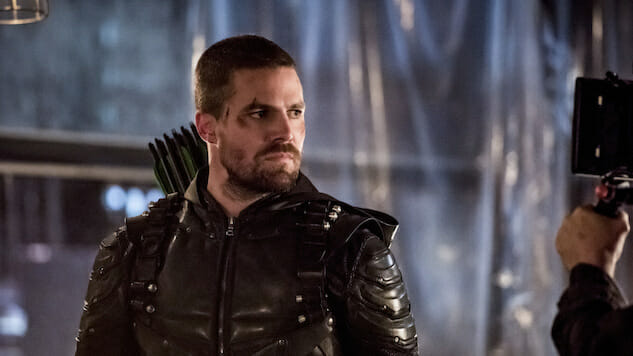As Arrow Looks Toward Its Endgame “Crisis,” What Matters Is What the Show Leaves Behind
Photo Courtesy of The CW
The end of an era is upon us, in more ways than one. Arrow, the CW’s very first superhero series, which introduced the story of the Green Arrow to an entire new generation of fans and kick-started much of the costumed vigilante TV craze that came after it, is hanging up its hood. The series will conclude after eight seasons and 170 episodes, departing the superhero television scene as an elder statesman that’s as good, both creatively and narratively, as it’s ever been.
Don’t get me wrong, Arrow’s gone through more than its fair share of bumps over the years. The series has often struggled under the weight of too many characters with too little to do, and its penchant for overly emotional melodrama—particularly during the middle part of its run—made some stories seem as though they existed solely to fuel unnecessary relationship drama. There are moments where many fans tuned out, angry over the death of a favorite character, bored by a specific villain, or annoyed over a repetitive story choice.
Here’s hoping they came back at some point, though. Because the series’ later seasons managed to fully reinvented the story of the Emerald Archer, allowing us to see both Oliver and everyone around him mature past their vigilante origins into something greater than what they once were. (Plus, the show seemed to remember it had a ton of fantastic women in the cast, and maybe it was time to center them in its story, which was great. Just saying.)
It’s not an accident that this sea change took place as both Oliver as a character and Arrow as a series began to look to both its future and its end. The introduction of the 2040 flashforwards not only reinvigorated the drama’s overall story, it gave it a purpose and a tangible legacy, wrapping up the tale of one Green Arrow just as the story of his daughter gets under way. With the looming threat of the “Crisis on Infinite Earths” adaptation that The CW has been hinting at since The Flash premiered back in 2014, a similar rebalancing is taking place within the Arrowverse itself, as the cross-network universe determines what it will look like without the show that gave it its name.
When Arrow premiered back in 2012 there wasn’t anything else like it on television. There was no superhero boom yet, and the time had not yet come when you could pretty much spit and hit a series on any given network bursting with costumed heroes, villains, and the people in between. Now we not only have the rest of The CW’s Arrowverse, but Marvel-based television series airing across at least three different networks on both cable and broadcast. There are niche-y, subversive superhero options like Doom Patrol, The Boys and The Umbrella Academy on multiple streaming services, and even prestige TV outlets are getting into the act, tackling more weird and esoteric fare like Legion and Watchmen. It’s amazing, to be sure, but something none of us would have likely ever predicted when Arrow first saw the light of day.
My point is: this is one of those times where being wrong feels great.
-

-

-

-

-

-

-

-

-

-

-

-

-

-

-

-

-

-

-

-

-

-

-

-

-

-

-

-

-

-

-

-

-

-

-

-

-

-

-

-








































